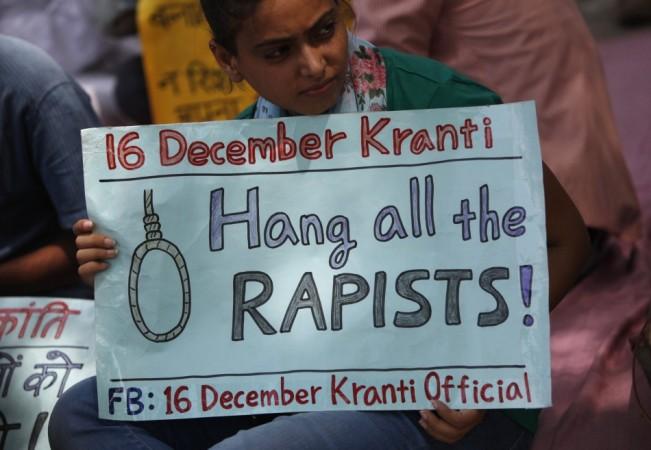
A fast track court in Delhi sentenced all four accused in the Delhi gang rape and murder case to death.
The judge at the Saket Court declared the death penalty to Vinay Sharma, Mukesh Singh, Akshay Thakur and Pawan Gupta, stating their crime as the "rarest of the rare case" and an inhuman act. The accused were convicted for raping a 23-year-old physiotherapy student on the night of 16 December, 2012, and causing her subsequent death.
Here is a timeline of the events in the case that shaped the fate of the four convicted men.
December 16, 2012: The young woman was gang-raped by six men in a moving bus in New Delhi and her friend was attacked with iron rods. They were both thrown off the vehicle in a semi-naked state with severe injuries. The victim was rushed to Safdarjung Hospital in Delhi.
December 17, 2012: Delhi police identify four of the accused in connection with the case. The condition of the victim was reported to be critical.
December 18, 2012: Protests commence in Delhi after news of the brutal gang rape emerged. Politicians condemned the crime.
December 19, 2012: The victim regains consciousness and expresses her desire to live. She said her attackers should be given due punishment.
December 23, 2012: The Sub-Divisional Magistrate records the victim's statement.
December 22, 2012: Home Minister Sushil Kumar Shinde said amendments will be made in the criminal law to impose strict punishment on the accused in rarest of rare cases of sexual assault.
December 23, 2012: Protests take place in several parts of the national capital and across the country demanding justice for the victim and improved security for women. Delhi Police close four Delhi Metro stations - Patel Chowk, Central Secretariat, Udyog Bhawan and Race Course stations.
December 24, 2012: Constable Subhash Tomar, who was on duty to control the protests in Delhi, sustains serious injuries. He is rushed to Ram Manohar Lohia Hospital but dies the next day.
December 25, 2012: The Metropolitan magistrate records statement of the victim for the second time.
December 27, 2012: The victim is secretly transferred from Safdarjung hospital to Palam Air Force station. She was then flown to Singapore's Mount Elizabeth Hospital for further treatment.
December 29, 2012: The victim dies at Mount Elizabeth Hospital due to multiple-organ failure.
December 30, 2012: She is flown back home from Singapore for cremation. The protests turn into peaceful candlelight marches to mourn her death.
January 3, 2013: Delhi Police submit a 33-page chargesheet against the five accused - Ram Singh, his brother Mukesh, Pawan Gupta, Vinay Sharma and Akshay Thakur. Police book them under charges of murder, gang rape, attempt to murder, kidnapping, unnatural offences, dacoity, hurting in committing robbery, destruction of evidence, criminal conspiracy and common intention under the Indian Penal Code.
The sixth, known by the alias "Raju", is relieved from the charges after he claimed to be a minor.
January 7, 2013: The five adult accused in the case are produced in Delhi's Saket Court. The accused Vinay Sharma and Pawan Gupta file petition to turn state witnesses. They confess to their involvement in the crime when produced in the court.
January 28, 2013: The Juvenile Justice Board declares the sixth accused in the case as a minor, on the basis of his school certificates which states that he was 17 years old at the time of the incident.
February 2, 2013: The five adult accused are charged with 13 offences, including murder. They are sent to judicial custody in Tihar Jail.
February 28, 2013: The Juvenile Justice Board books the minor accused in the case with rape and murder charges.
March 11, 2013: Ram Singh, the prime accused in the case, was found hanging in his cell at the high-security Tihar Jail at around around 5 am.
March 12, 2013: Four other accused facing trial and imprisoned in the Tihar jail write to Home Minister Sushil Kumar Shinde and Delhi police chief seeking protection.
March 12, 2013: The Anti-rape law bill which is based on the Verma Commission is delayed by the cabinet after senior ministers disagree over key features, including the age of the consent.
March 12, 2013: Delhi police give clean chit to eight accused in the constable Subhash Tomar's death, after no evidence was found during the anti-rape protests at the India Gate, New Delhi.
March 14, 2013: Questions rise over Ram Singh's apparent suicide as he shared the cell with three others who claimed to have been asleep during the entire episode.
March 25, 2013: Ram Singh's brother Mukesh is admitted to hospital after complaining of chest pain.
April 1, 2013: Government serves show-cause notices to two senior IPS officers in Delhi for negligence in duty during the night of 16 December, when the girl was brutally raped and assaulted.
April 2, 2013: Vinay, one of the accused in the Delhi gang rape case, files an application to special judge Yogesh Khanna seeking provision for healthy food and reading material in jail.
May 15, 2013: Vinay is admitted to Deen Dayal Upadhyay Hospital with high fever. His lawyer tells the Saket Court that the accused has been poisoned and was puking blood.
July 20, 2013: Heera Lal, father of the accused Pawan Gupta, defends his son claiming that he was not present in the bus where the incident took place.
August 31, 2013: Juvenile court finds the 17-year old accused guilty of the heinous crime and sends him to live in a reform house for three years.
September 10, 2013: Delhi Saket Court declares the four men as guilty of murder and gang rape among other offences. Accused to be sentenced on 13 September.
September 13, 2013: The fast-track court sentences the four accused to death, stating the crime as the rarest of rare cases.








!['Lip lock, pressure, pyaar': Vidya Balan- Pratik Gandhi shine in non-judgmental infidelity romcom Do Aur Do Pyaar [ Review]](https://data1.ibtimes.co.in/en/full/797104/lip-lock-pressure-pyaar-vidya-balan-pratik-gandhi-shine-non-judgmental-infidelity-romcom.jpg?w=220&h=138)








